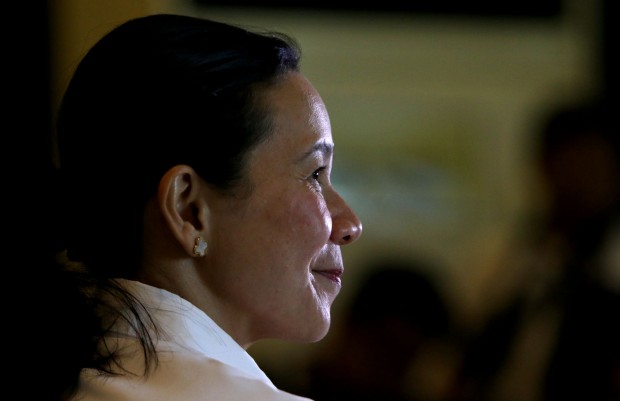
Presidential bet Senator Grace Poe said she will no longer present the results of her DNA tests with possible relatives in Jaro, Iloilo, saying she and her camp are using legal basis, and not the DNA results, to prove that she is a natural-born Filipino citizen during a press conference with Senator and Vice Presidential bet Chiz Escudero on a restaurant in Dasmarinas, Cavite.
INQUIRER PHOTO / RICHARD A. REYES
Why is Sen. Grace Poe, who was unjustly abandoned at birth by her parents, being unjustly compelled to find them just to prove that she is a natural-born Filipino?
Associate Justice Marvic Leonen made this point on Tuesday at the start of oral arguments in the Supreme Court while questioning Poe’s lawyer, Alexander Poblador, on a petition by the senator to set aside her disqualification in the May presidential balloting by the Commission on Elections (Comelec) for alleged abuse of discretion.
The Comelec has decided to nullify the certificate of candidacy of Poe, a foundling whose parents are unknown, for failing to meet the expressed constitutional requirements that candidates for high office should be natural-born citizens and should have lived for at least 10 years in the country.
Leonen pointed out that Poe’s being abandoned after birth was wrong and unjust. He said the senator was “lucky” because she was adopted by movie stars Fernando Poe Jr. and Susan Roces.
Recounting that he grew up without a father, Leonen said Poe surely had a “very difficult time” growing up not knowing who her real parents were.
Where’s justness?
He asked why a foundling like Poe would be compelled to look for her real parents or required to prove her parentage, such as through DNA testing, when ordinary Filipinos only need to show their birth certificates to prove their parentage and citizenship.
Those birth certificates were prepared by somebody else, he noted.
“At the end of the day, should this court ask her to look for those parents who actually left her because she had it lucky. She is now one of the candidates to become President of this country. Do you think that is a fair result? It’s clear to us what should happen in terms of justness. Can our laws actually contain that kind of a result? Is it clear enough to say that the Constitution of the Republic looks this way on foundlings? That there can never be any foundling found in a rural area of the Philippines that can ever become President?” he explained.
“We are here not as legalists, we are here as justices. The root word is not ‘legal’ but it is ‘just’—meaning to say we do justice in accordance with law but if we can interpret law so that it can do justice then so be it. So we are not completely legalists,” he said.
Leonen added that the cases against Poe also pertained to Filipinos who went overseas to work or reside and decided to come home to run for public office.
He said laws were made to give such expatriates, or balikbayan, to reestablish their residencies and reacquire citizenships.
Poe had lived in the United States with an American husband and had become a US citizen. She later decided to reacquire her Philippine citizenship and run for high office.
Poe insists foundlings like her should be regarded as natural-born, otherwise those with unknown biological parents would become stateless and, worse, denied the right to serve the country.
Let people decide
Leonen joined the position of some Poe supporters, including former Chief Justice Artemio Panganiban, who held that the expressed provision of the Constitution on qualifications of presidential aspirants should be disregarded and the issue thrown to the electorate, saying the voice of the people is the voice of God.
It was the electorate, in exercise of their sovereign right, who had ratified the Constitution, Leonen said.
The magistrate said the Constitution already provided a mechanism for the people to decide whom to elect and the court could only step in to become the final arbiter should there be a contest.
It is the 1987 Constitution that is in effect today and not the old 1935 and 1973 Constitutions that applied to specific historical periods of the country, Leonen pointed out.
He said justices should confine themselves to the reading of the text of the present Constitution to find its meaning and apply it to a situation that may not have been contemplated by the framers.
No power to judge
Under the 1935 Constitution, in effect when Poe was born in 1968, only those born of Filipino fathers are regarded as natural-born, while those born of Filipino mothers have to elect their citizenship upon reaching the age of majority.
According to Leonen, this year marks the first time in the country’s history that a founding will be running for President so it will be the first time that the court will be laying down a doctrine on foundlings.
“Don’t you think it’s the better part of prudence that we follow what the Constitution says, that the Supreme Court has jurisdiction over election contests to determine the qualifications of [presidential] candidates,” he said, referring to the court’s role as the Presidential Electoral Tribunal.
Leonen pointed out that the Constitution never granted the Comelec the power to adjudicate on qualifications of elected national government officials.
He said the Comelec should have just confined itself to evaluating Poe’s certificate of candidacy and determining whether the facts stated there, from her point of view, were correct or not.
To interpret these facts, Leonen said, “is a matter of opinion and law; to do so would be to adjudicate,” which the Comelec is barred from doing by the Constitution.